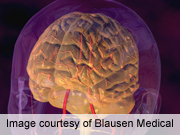
TUESDAY, April 17 (HealthDay News) — Most people with obsessive-compulsive disorder manage their symptoms through talk therapy and medication. But for some, severe OCD can take over their lives. A few eventually turn to brain surgery, and a new study shows how they fared.
The study included 63 adult patients who underwent “stereotactic anterior cingulotomy” at Massachusetts General Hospital from 1989 to 2010, with long-term data available for 59 of the cases.
“Half these patients had a very significant improvement in their symptoms — more than 35 percent improvement in the OCD scale that we use,” said Dr. Sameer Sheth, chief resident in the department of neurosurgery at the hospital.
“These are patients who are completely refractory (unresponsive) to medical or behavioral therapy and have gone for years, if not decades, completely incapacitated,” he added.
Patients who responded “are often still taking their medications and they’re still undergoing behavioral therapy, but it’s actually making a difference,” Sheth said. “They’re able to stop the hand washing, stop the checking, stop the hoarding, all these symptoms they had before, and carry on with their lives.”
He was scheduled to present the research Tuesday at the American Association of Neurological Surgeons’ annual meeting, in Miami.
People with obsessive-compulsive disorder have recurrent, upsetting thoughts that lead them to perform repetitive behaviors or rituals to try and relieve their anxiety. According to the U.S. National Institute of Mental Health, one in 100 adults in the United States has obsessive-compulsive disorder, and half are severe cases.
Obsessive-compulsive disorder symptoms in severe cases “can take over the entire day,” said Kiara Timpano, an assistant professor in the department of psychology at the University of Miami who works with patients with OCD.
“With a hand-washing or showering obsession, a person could take up to six hours a day, doing their washing ritual. That’s just torture,” Timpano added.
Frontline psychological treatment for obsessive-compulsive disorder is called exposure therapy. Medications include selective serotonin reuptake inhibitors (SSRIs). Estimates vary, but for a quarter or more of patients, these therapies don’t work.
Neurosurgical options include gamma-knife surgery and deep brain stimulation, as well as cingulotomy. But potential candidates for these options must undergo a rigorous screening, Sheth said.
Both experts emphasized that the surgical candidates in the study had failed rounds of single- and multiple-drug therapies as well as behavioral therapies and were vetted by a multidisciplinary committee.
Most patients who do undergo a cingulotomy don’t experience any complications, Sheth said. In his study, he reported, three developed abulia — a difficulty in interacting and unresponsiveness — lasting a few days; one patient developed seizures that required medication, and another had an infection.
In addition, he said, two patients committed suicide at some point after undergoing the procedure. One occurred a few weeks after the surgery, and the other about a year later. He noted that along with obsessive-compulsiveness, patients are monitored for depression.
“These patients with this severe OCD often have [co-existing] depression, major depression,” he said. “So in a group of moderately to severely depressed patients over a 20-year time span, two out of the 63 is probably a similar fraction to what you’d expect.”
The research is ongoing, Sheth added, with the team keeping track of these patients — who come from all over the world — indefinitely.
And Timpano noted, “I think it’s important that they’ve demonstrated this follow-up on a fairly large group of patients. It really lets us see how people who’ve received the cingulotomy do in the long run.”
Sheth’s team reported on results to date in the American Journal of Psychiatry in 2002, and the current results are under review for journal publication. Findings presented at medical meetings are typically considered preliminary until published in a peer-reviewed journal.
More information
The International OCD Foundation has more about obsessive-compulsive disorder.

